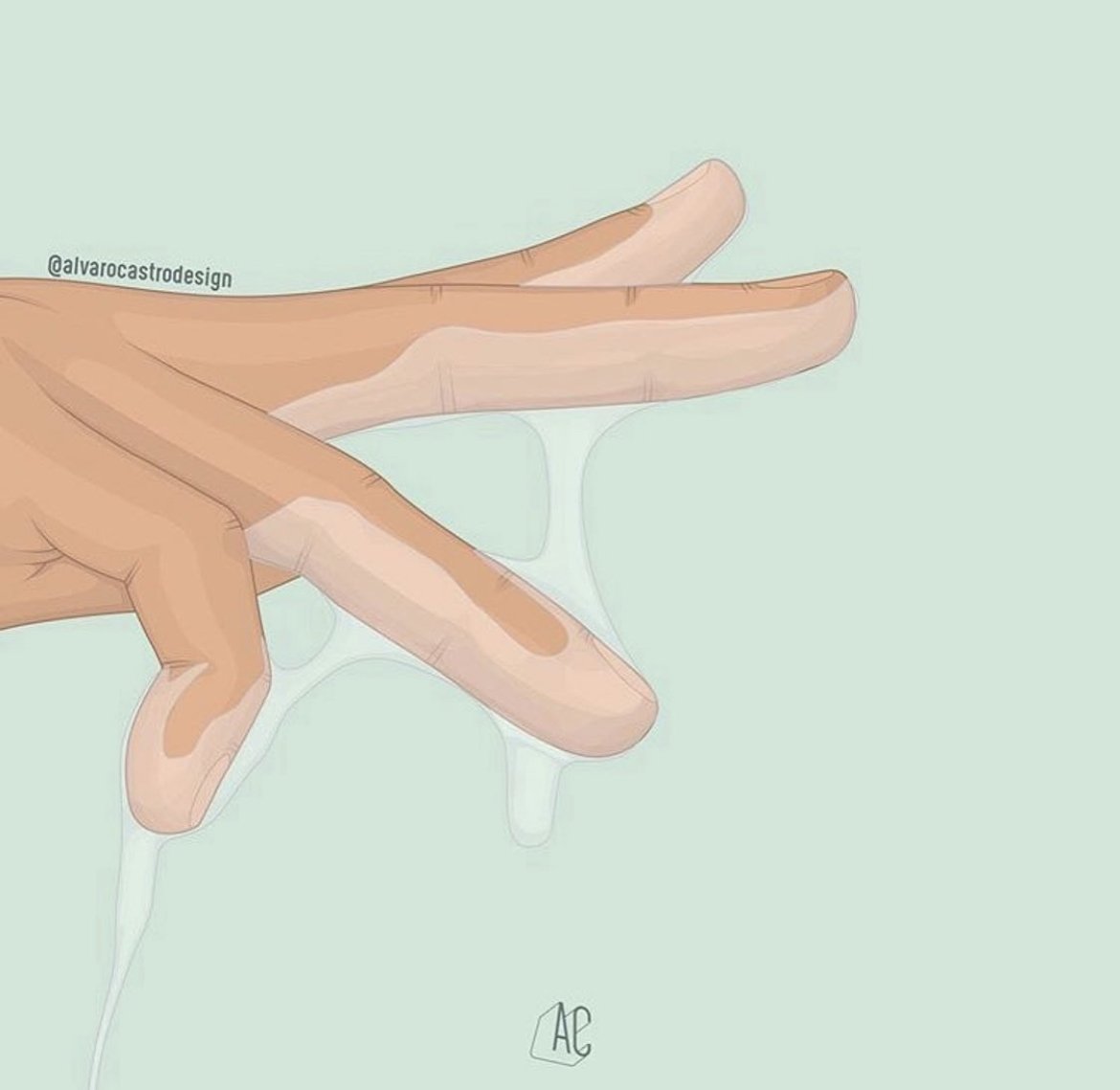The Monster Under the Bed: Should You Be Worried About Your Relationship
Art by the talented @saraa.stani
My relationships are great. I am happy. I feel loved. And yet…
Every now and then, something will happen (in real life or in my head) that will send me spinning. I will feel triggered, fearful, hypervigilant, and convinced that something bad is or will happen in my relationship(s).
During my last fear-induced emotional tornado, I reflected on a question posted by activist and performer Laverne Cox: “Is me not feeling safe: about some trigger in my past, or about what's really going on right now?” Essentially, is there any real danger, or am I just afraid of an emotional ghost?
Author Ibram X Kendi stated it clearly with the observation that: “There is a difference between fear and danger.”
Our bodies are designed to respond to danger
When there is real danger, it is appropriate for our minds and bodies to respond.
Distress signals are sent from the amygdala to the hypothalamus, which in turn communicates to the nervous system that person needs to get ready to fight or flee.
The heart beats faster than normal, pushing blood to the muscles, heart, and vital organs. The pulse rate and blood pressure go up. The lungs take in as much oxygen as possible with each breath. Sight, hearing, and other senses become sharper. The epinephrine triggers the release of blood sugar and fats, flooding into the bloodstream, supplying energy to all parts of the body.
These changes happen so quickly that people aren't aware of them. The prompts are engaged even before the brain's visual centers have had a chance to fully process what is happening.
It is an incredible act of neurobiological teamwork, designed to react quickly and ensure our survival. And while this beautiful internal symphony is the appropriate response when running away from a lion, it is far less helpful when having an argument with your partner about the unwashed dishes.
It’s not about the dishes
Only, as most of us argument experts will tell you, it is never really about the dishes. Dirty dishes also represent fear – fear of not being heard, of being taken advantage of, of an inequity or unbalance of responsibility, and when you drill down to the core of it…fear that the person you are with will not be able to take care of you or your home in the way you need.
And while dirty dishes may not represent true danger, unfortunately, many of us have experienced some form of trauma which has validated the existence of danger. Acute trauma (a single stressful or dangerous event), chronic trauma (repeated and prolonged exposure to highly stressful events), or complex trauma (exposure to multiple traumatic events), may leave us protective and afraid long after the traumatic event or series of events have taken place.
We have a built-in cataloging system to keep track of such dangers and perceived threats, rooted in our very human desire not to die.
Imagine being a one-year-old; if your caregiver does not respond to your needs, you could die. You need a responsible adult to feed you, clean you, keep you safe, and teach you how to navigate the world. As we grow, our minds and bodies keep note of the times when we are not taken care of. Each time our needs go unmet, each moment of mistrust, each betrayal, each abuse of power gets catalogued so that our brain knows how to protect us and keep us safe the next time.
By the time we are adults, we have an extensive (and often unconscious) catalogue of experiences, pains, fears, and trauma. As a result, we become hypervigilant at noticing signs that may indicate that we are not safe.
Your partner did not do the dishes? That must mean that they are irresponsible or do not care that you want a clean home. What else don’t they care about? How else could their irresponsibility impact you? Clearly, you need to do everything. Clearly, you arethe only one who is responsible and can keep yourself safe. Clearly – if not corrected – your partner and their behavior can be a danger to you.
Cue the amygdala, the hypothalamus, and the cascading neurobiological reactions that were developed centuries ago to keep us safe from lions…and apparently also dirty dish villains.
The Non-Monogamous Simone Biles
Most fear-inducing relationship moments are more complicated than a sink of unwashed dishes. Particularly for those within an open relationship.
A partner staying out later than usual with their date may prompt a fear that they love that person more than you and will leave you for them. A partner being protective of their phone may prompt a fear that they are hiding something and may be crossing a boundary or stepping on an agreement. A partner purchasing a gift for their other partner may prompt fear that you are no longer important, you are being taken advantage of, and can no longer rely on them to appreciate or care for you.
While it certainly takes some mental gymnastics to go from “they are an hour late” to “clearly they are out talking about how they are going to run away together” – when it comes to fear, we all become as mentally agile as Simone Biles.
It is in these moments when we are pacing the living room having imaginary conversations in our minds with our partners about the surely inevitable argument we will have with them about the fact that they are leaving us and our children for this new crush…during these moments we need to reflect back on those words from Laverne Cox and Ibram X Kendi:
“Is me not feeling safe: about some trigger in my past, or about what's really going on right now?” because “there is a difference between fear and danger.”
Is it a real or perceived threat?
When you feel your body preparing for fight or flight. When the imaginary arguments start playing themselves out on your mind like a well-rehearsed script. When the fear is rising and you find that you are becoming emotionally hijacked, ask yourself, “What am I afraid of? And is there any real danger?”
Often simply stating the fear out loud can provide a reality check that can ground you: “I am afraid that my partner asking to switch our date night to accommodate someone else means that they are falling out of love with me and that they are planning on breaking up with me.” Saying it aloud may help you hear the mental gymnastics you have taken to come to that conclusion and may help you determine that while there is fear, there is – in fact – no real danger.
What are you afraid of?
So if there is no real danger...what are you afraid of?
Your Partner – Do you have doubts about your partner’s integrity? Have they demonstrated that they are not to be trusted via a pattern of behavior?
Yourself – Are you afraid that you cannot trust yourself or your judgment? Based on a pattern of your behavior, are you concerned that you will make a misjudgment that will put you at risk?
Your Past – Have there been people in your past who have hurt you? Have you been abused, chronically lied to, gaslit, or mistreated? Does your current situation trigger some past memory or old wound that is resurfacing?
What do you need to do to feel safe?
The strategy for feeling safe is different depending on what is triggering your fear. And in all cases, it is wise to work with a coach or therapist to help you (and perhaps also your partner) talk through the fears, reality check them, understand if/ where there are real dangers, and develop tools and a network to support you with your next steps.
If your fear is based on your partner, then it may be time for you to have a candid conversation with yourself (first) and then your partner. If there has been a pattern of them stepping out of their integrity, violating your agreements, or being untruthful, it sounds like it is time for you to address those behaviors to gain an understanding as to why they continue to act in that way, why you continue to tolerate it, and – ultimately – to decide if your partner has the skills, willingness, and discipline to demonstrate their respect for you and your relationship via their actions. And, more importantly, if you respect yourself enough to walk away from a relationship that is not promoting your safety and thriving. Consider partnering with a relationship coach or couples’ therapist to have a structured space for these tough conversations and decisions.
If the fear is based on yourself, then it may be helpful to reflect on your pattern of behavior that exposes you to risk. What about this behavior or these unhealthy situations feed you? Does it feel familiar based on your past, and do you find yourself replicating toxic relationships? Are you driven to see past the reality to the potential of a person or situation and stay long past the expiration date because you are convinced that your time, effort, and will can fix things? Consider partnering with a coach or therapist to have a structured space to unpack your behaviors, understand the source, reframe the stories in your head that are leading to your actions, and develop a strategy and network to support your growth.
If the fear is based on your past experiences, then it may be time for you to address the ghosts. Remind yourself that your partner is not the person who hurt you, that you are not the person you once were, and that this situation is not the same one that you were once in. Thank your brain for trying to keep you safe, have empathy for the parts of you that are still scared and fighting for security, and allow yourself to be present to your current reality instead of in the stories in your mind. Consider partnering with a coach or therapist to have a structured space to voice your previous experiences, process the hurt, understand the impact, and develop the tools to make choices on the present vs. the past.
Turn on the lights and address the scary thing
Have you ever woken up in the middle of the night and had your heart jump into your throat at the sight of a ghost or intruder in your bedroom, only to flip on the light and see that the monster was – in reality – a pile of clothes on your chair?
Sometimes we just need to turn on the light to see that the thing we fear poses no real danger. And then we have to do something about it.
In the morning, address the piles of clothes. Put them away so as not to have another moment of midnight panic when you wake up for a late-night bathroom trip. Similarly, once the lights are on (and you are rested and ready to get to work), address the piles of fears that are creating unnecessary panic.
There are many real dangers that people are facing nowadays that require our time, attention, and advocacy; don’t spend any more energy on monsters.
Still have questions? Check out the podcast, or find community on Facebook and Instagram. You do not need to figure this out on your own; stay find and connect with a curious community of friends.
To hear more curious and courageous stories, subscribe to Curious Fox for free or find us on Patreon for even more bonus content. Each week you will find more stories and lessons, as well as ways that you can explore your curiosity.











